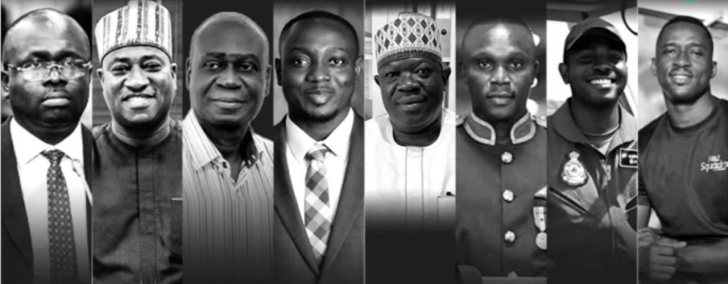The tragic helicopter crash on August 6, 2025, which claimed the lives of eight Ghanaians, including Defence Minister Dr Edward Omane Boamah, and Environment, Science and Technology Minister, Alhaji Dr Ibrahim Murtala Muhammed, has reignited national anguish over the illegal mining scourge they sought to combat.
The ministers, alongside six others, were en route to Obuasi for a critical mission against galamsey when their military Z9 helicopter crashed in the Ashanti Region, leaving no survivors.
As coffins draped in the national flag are prepared for their state funeral, Ghanaians are left grappling with a painful question: how do we honour these fallen patriots?
Some argue for brute force, sending soldiers to bomb mining pits and chase desperate diggers.
But such an approach misdiagnoses the problem. Galamsey is not a rogue army; it is a sophisticated, politically shielded enterprise.
To end it, we must dismantle its machinery, starting with the excavators that fuel its destruction.
The helicopter crash, though still under investigation, reflects the perilous stakes of Ghana’s fight against illegal mining.
Eyewitnesses reported foggy conditions and low altitude before the aircraft’s fatal descent.
Yet, the deeper tragedy lies in the mission itself: these leaders died while confronting a menace that has poisoned 60 per cent of Ghana’s freshwater, ravaged thousands of acres of cocoa farms, and turned rivers such as the Pra and Birim into toxic sludge.
Their death must neither be in vain nor justify reckless solutions.
Calls for militarised crackdowns ignore galamsey’s entrenched ecosystem.
The miners wielding pickaxes in pits are often impoverished youths lured by the promise of daily wages.
Bombing these sites would mean killing vulnerable Ghanaians while the true architects, the financiers in Accra and Kumasi, the politicians who trade permits for votes, and the foreign enablers importing excavators, remain untouched.
Consider the hypocrisy: Prof. Kwabena Frimpong-Boateng’s leaked report named high-ranking officials in both the NPP and NDC as galamsey sponsors, yet none have been prosecuted.
Meanwhile, Chinese operators, shielded by local collaborators, deploy heavy machinery with impunity. Since 2008, over 50,000 Chinese miners have flooded Ghana, armed with excavators that dwarf traditional artisanal methods.
The transformation of galamsey from artisanal digging to industrial-scale devastation coincided with the influx of heavy equipment.
Before the era of excavators, illegal mining relied on manual labour.
Today, it strips forests and riverbanks at an alarming speed.
Rather than sending soldiers to confront desperate miners in remote areas, we should be targeting these networks.
The government must strengthen oversight at our ports to prevent the illegal importation of mining equipment.
Existing laws against the transport and use of excavators in unauthorised areas must be enforced without exception.
Financial investigations should follow the money trail to expose and prosecute the powerful individuals bankrolling these operations.
We must also address the economic desperation that drives people into illegal mining.
In communities where galamsey has destroyed traditional livelihoods such as farming and fishing, we need to create viable alternatives.
Vocational training programmes, sustainable agricultural initiatives, and legal small-scale mining opportunities could provide better options for those currently trapped in the galamsey economy.
History warns us: Operation Vanguard and other militarised crackdowns failed because they ignored the supply chain.
Meanwhile, children in Upper West are dropping out of school to mine, while cocoa farmers watch their lands vanish.
A farmer near the crash site wept as he recalled the helicopter’s explosion: “I hurried to help, but there was no one to rescue”.
The death of Dr Boamah and Dr Muhammed should serve as a wake-up call, but not an excuse for reckless action.
These men dedicated their careers to serving Ghana through thoughtful policy and measured action.
The best way to honour their memory is not with knee-jerk militarisation, but with a comprehensive strategy that addresses the root causes of illegal mining while protecting vulnerable citizens caught in its web.
The fight against galamsey is ultimately a fight for our nation's future.
We cannot win it by turning our guns on our own people, but by having the courage to confront the powerful interests that have allowed this crisis to fester.
That would be a fitting tribute to the public servants we lost last week, and the only path to lasting solutions.
The fallen ministers understood galamsey’s complexity. Dr Boamah, a defender against jihadist threats, and Dr Muhammed, a crusader for environmental justice, knew real victory required dismantling networks, not brutalising pawns.
As we bid them farewell, let us honour them by fighting smart, not just hard.
The excavators, not the exploited, must be Ghana’s target. Anything less betrays their legacy and our future.

